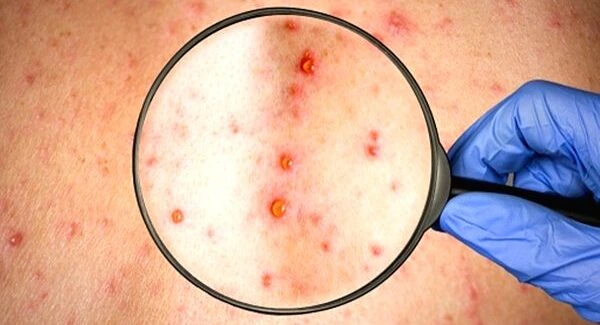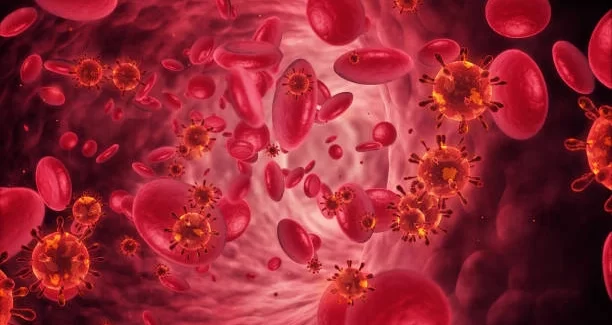How Do You Get The Chickenpox Exactly? Know Here!

Posted Date: February 25th, 2023
If you have ever been infected with chickenpox or have seen a loved one suffer from a common viral disease then you know that it is an unpleasant and uncomfortable experience. Chickenpox is a highly contagious virus caused by the varicella-zoster virus (VZV). It generally leads to an itchy rash that appears earlier in children than in adults. The small bumps will turn into fluid-filled blisters, eventually scabbing over and fading away after a few weeks. The virus can sometimes lead to serious complications, including pneumonia and encephalitis (brain inflammation).
Characterized by red itchy rashes of blisters all over the skin and incredibly contagious, chickenpox can make life difficult for those who come into contact with its symptoms. In this blog post we’ll dive into what causes chickenpox its possible treatments and preventive measures to avoid getting it in the first place. Whether you’re looking to get informed about how to treat existing cases of chickenpox or protect yourself against potential outbreaks, stay with us – we’ve got all the answers!
How is it spread?
The chickenpox virus is easily spread through direct contact with the rash, saliva, or mucus. It can also be spread through indirect contact like sharing clothing and towels, breathing in chickenpox particles released into the air when infected individual coughs or sneezes and touching surfaces that have been contaminated with the virus.
The virus is highly contagious and can spread quickly. In fact it can be effective even before any rash appears. As soon as a person becomes infected, the virus particles multiply in their body and will show symptoms within 10-21 days after first contact with another infected individual.
For healthy individuals, chickenpox is usually a mild illness that passes in a few weeks. But, due to its contagious nature, individuals with weakened immune systems or those who are pregnant should particularly be careful when exposed to the virus as it can lead to serious complications. To prevent infections, parents should ensure that their children receive the chickenpox vaccine which is effective in nearly 95% of cases. However if an individual does contract the virus, treatments are available to help manage its symptoms.
How can chickenpox be treated?
Chickenpox is one of the most common childhood illnesses and can cause mild to moderate symptoms. Although it is generally not a serious condition it can be very uncomfortable for children so treatment is important.
The main way to treat chickenpox is by relieving the symptoms. Over-the-counter medications such as ibuprofen and acetaminophen can help to reduce fever and discomfort associated with the condition. It is important that children drink plenty of fluids, as dehydration can be an issue during chickenpox. Regular bathing with lukewarm water may also help to relieve itching caused by the rash. Applying calamine lotion or cornstarch paste can soothe itchy skin and reduce the intensity of the rash.
Antiviral medications may also be prescribed to help treat chickenpox in some cases. These drugs such as acyclovir, can help reduce the severity and duration of symptoms. If taken during the early stages of the illness, they can potentially prevent complications from occurring. It is important to note that antiviral medications are ineffective in treating all chickenpox cases.
In addition to the above treatments, children with chickenpox should get plenty of rest. Stress and fatigue can worsen symptoms so it is important for them to take breaks throughout the day and get adequate sleep each night. Keeping children from other people is also important, as chickenpox is highly contagious. Children with the condition should stay at home and avoid contact with anyone who isn’t immunized.
What preventive measures can you take?
The best way to prevent chickenpox is by getting vaccinated. The chickenpox vaccine contains a weakened form of the virus which helps the body build immunity. This means that if you come into contact with the live virus your body can fight it off without developing the illness. It’s important to note that while immunization is the most effective way to protect against chickenpox it’s not 100% foolproof.
In addition to vaccination you can take other preventive measures to reduce your chances of developing or spreading the virus. It is important for everyone, especially those who have not been vaccinated to practice good hygiene and avoid contact with people who may have the virus. This includes washing your hands regularly, avoiding touching your face and covering your mouth and nose when you sneeze or cough.
If someone in your household has chickenpox it is important to keep them away from others as much as possible until their rash has healed and all of their blisters have crusted over. Make sure they have their own bedding, towels and clothes to reduce the risk of spreading the virus to other household members.
It is also important for those who are at high risk of complications from chickenpox to avoid contact with people who may be infected. This includes pregnant women, people with weakened immune systems and people undergoing treatment for cancer. If you are in contact with someone who has chickenpox it is important to get vaccinated and monitored by a healthcare provider as soon as possible.
What are the potential complications?
Chickenpox can lead to serious and potentially life-threatening complications in some cases. These include bacterial infections, pneumonia, encephalitis (brain inflammation) and sepsis (blood poisoning). It is important to seek medical attention immediately if any of these symptoms develop.
People at higher risk of developing severe complications from chickenpox include pregnant women, people with weakened immune systems, newborns and those undergoing cancer treatment. These individuals should seek medical attention immediately if they come into contact with someone who has chickenpox.
People of all ages can experience long-term health problems after having chickenpox. The most common complication is shingles which are caused by the same virus. It typically causes a painful rash with blisters lasting for weeks or months. People who have had chickenpox are also at higher risk of developing postherpetic neuralgia (PHN), a condition characterized by persistent nerve pain that can last for years.
It is important to note that the risk of developing these long-term health problems increases with age. This is why it is important to vaccinate against chickenpox if you have not already had the virus and are over 12 months old. In some rare cases, chickenpox can lead to more serious complications like swelling of the brain and other organs, pneumonia, blood clots and even death. It is important to recognize the signs of these complications early so that treatment can be sought immediately. Symptoms may include high fever, confusion, seizures, difficulty breathing, chest pain or paleness.
However, it is important to remember that these complications are rare. Vaccination is the best way to prevent chickenpox and its associated risks. By taking steps to protect yourself and those around you you can reduce your risk of contracting and spreading the virus. Talk to your doctor or healthcare provider if you have any questions or concerns about chickenpox prevention and treatment.
QUES 1: Can we bathe during chicken pox?
ANS: No you should not bathe while you have chicken pox. Bathing can cause the virus to spread further and make your symptoms worse. It is best to take regular showers using lukewarm water instead to keep clean without worsening the infection. Also, when taking showers it’s important to ensure that any towel or washcloth is washed with hot water after being used on the person infected with chicken pox. Lastly, be sure to avoid swimming pools and public baths during this period as they will likely contain a higher amount of bacteria and viruses which could be dangerous for someone with an active infection like chicken pox.
QUES 2: How long does chicken pox last?
ANS: Chicken pox is a highly contagious infection caused by the varicella-zoster virus. The typical duration of chicken pox ranges from 10 to 21 days, although in some cases it can last up to 6 weeks. Symptoms usually start with a mild fever, followed by an itchy rash that forms blisters all over the body. The rash typically starts on the face, chest and back before spreading to other body parts, including the arms and legs. As time passes, these blisters will dry out and form scabs that eventually fall off; however this process can take several weeks. It is important for anyone who has been infected with chicken pox to stay inside as much as possible so that they do not spread the virus around. After recovering from chicken pox you should remain vigilant in keeping your skin clean to prevent scarring or further complications from scratching at the affected areas during itching episodes.
QUES 3: Can Chicken Pox clear up in 3 days?
ANS: While it is possible for Chicken Pox to clear up in 3 days it is not the norm. Generally Chicken Pox can last anywhere from 5-10 days, depending on the individual and the severity of their symptoms. In addition some people may experience itching for several weeks after their symptoms have gone away.
The virus that causes Chicken Pox (Varicella Zoster virus) takes time to run its course and will typically peak after three days before gradually beginning to subside. During the first couple of days you may notice a rash that starts as small red bumps which eventually turn into fluid-filled blisters all over your body before scabbing over and finally fading away. It’s also important to note that while you may be contagious during this period it’s important to keep your hands clean so as not to spread the infection; this includes avoiding contact with any other person or pets who could catch the virus from you!
It’s important for anyone infected with chicken pox by themselves or someone else to get proper medical attention if they feel unwell even after a few days, as infections like these can become more serious if left untreated.
QUES 4: Can Chicken Pox be treated at home?
ANS: Chicken Pox can be treated at home with a variety of natural remedies and medications. Over-the-counter treatments such as calamine lotion, antihistamines and topical creams can help reduce itching and soreness associated with the condition. Additionally, keeping the affected area clean and dry is important to help ease discomfort. Although chickenpox of mild cases can be managed well without medical intervention it’s always important to consult your doctor if you notice signs of worsening symptoms.
More serious cases may require prescription antiviral drugs or antibiotic treatments for secondary bacterial infections. Oral antibiotics should only be used when necessary as they are often overprescribed and not used indiscriminately due to their potential side effects like nausea or diarrhea. Also make sure to practice good hygiene by maintaining a healthy diet that includes plenty of fruits and vegetables while avoiding sugary snacks or processed foods which will trigger inflammation in your body leading to further complications related to chicken pox treatment.
The Bottom line:
Chickenpox can be a mild disease in healthy children but more severe in adolescents and adults. If you think you or your child may have chickenpox make an appointment to see your doctor as soon as possible. There is no specific cure for chickenpox but there are treatments that can help relieve the symptoms and shorten the duration of the illness. Prevention is always better than treatment so if you have not had chickenpox make sure to get vaccinated. Thanks for reading! We hope this article helped understand more about chickenpox.
Related Posts
Dr. Emily Carter is a seasoned health writer and wellness advocate at Healths News Today. With over a decade of experience in the healthcare industry, she specializes in translating complex medical information into easy-to-understand content that empowers readers to make informed decisions about their health.








